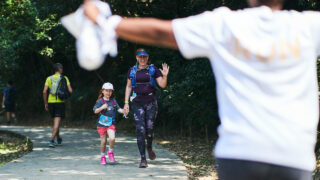Is it the fault of your parents that you’re shortsighted? Yes and no, as Verne Maree finds out, while also suggesting a few paths to better eyesight.
Poor eyesight runs in families, but the causation is not as direct as you might think. The child of two near-sighted parents has a one-in-three chance of being nearsighted too. If neither parent is near-sighted, the probability is a mere one in 40.
It’s understandable, then, that my 20-20 vision parents were surprised when the school nurse sent a note to say that their nine-year-old daughter was as blind as a bat and urgently needed some nice, thick spectacles. Each year, those lenses got thicker. Later on, my younger sister developed myopia too – but nowhere near as bad as mine.
Most eye problems are caused by the eyeball being too long or too short, causing the cornea or lens to refract light too far in front of or behind the retina. Too short, and you’re myopic, meaning short-sighted. Too long, and you’re farsighted – able to make out distant road signs, but not the ingredient list on a cereal box. (The upside? You’ll be able to enjoy those toxic Fruit Loops in blissful ignorance.)
Nature or Nurture?
As usual, it’s a bit of both. Poor eyesight can have just as much or more to do with lifestyle as it does with genes – and the fascinating new science of epigenetics sheds new light on the nature vs nurture debate. Epigenetics, of course, concerns itself with the ways in which environmental factors influence gene expression. Being an avid cricket player, crosscountry runner or kite-flyer would tend to switch off your myopia genes, for example, while an obsession with Lego or gaming would tend to switch them on.
If I’d spent more time playing outside and less time curled up indoors with my nose in a book, I may not have ended up incapable of reading the number on a bus … and possibly even learnt how to throw a ball.
Exposure to bright sunshine could be another important factor. A 2013 Australian study suggests that children who spend more time outdoors are less likely to be or to become myopic, irrespective of how much near work they do or whether their parents are myopic. It seems that bright light may stimulate the release of dopamine from the retina, which works to prevent elongation of the eye.
According to Stanford University’s The Tech website, only 25 percent of teenagers were near-sighted 30 years ago. Today, the figure is 80 percent!
That has nothing to do with the Hong Kong gene pool, note. It’s because spending so much more time reading, watching TV and playing video games rather than playing outside is switching on myopia genes that might otherwise not be expressed. The theory is that having to focus for too long on things up close changes the eye’s shape: it elongates the eye so that it can no longer focus on faraway objects.
And it doesn’t stop with the individual: epigenetic changes are heritable. Through something called epigenetic inheritance, your lifestyle choices may epigenetically alter the DNA you pass on to your children and future generations. It’s a sobering thought.
Do glasses weaken vision?
Though it’s popularly believed that wearing “corrective” glasses or contact lenses worsens eyesight, industry consensus is that it doesn’t. It’s explained that eye conditions tend to worsen anyway over time, whether or not glasses or contacts are worn.
And yes, they acknowledge, it will seem harder to read the printed page when you take your new specs off; but that’s because you’ve got used to being able to see more clearly than you did before – it’s that sudden contrast between your own poor vision and the normal vision your specs give you.
Wearing glasses, they say – whether for congenital myopia or for presbyopia, the loss of near vision that happens in our forties – will not make your vision worse. But it hugely lessens any need to look for possible ways to strengthen the eyes themselves.
Having undergone Lasik surgery seven years ago, I no longer need glasses or contacts, and that’s been wonderfully liberating. No one who’s ever required glasses or contact lenses needs me to explain the various drawbacks and annoyances of these things.
But I can’t help wondering if anything could have been done to help stop my eyesight deteriorating so badly in the first place – down to -9 in the left eye by my 21st birthday!
Apart from tearing up my library card and ordering me to play outside, were there any options for natural vision correction?
Natural ways to train the eyes
Natural vision improvement – through exercise, massage, or diet – is a long-held dream, as webmd.com notes. A leading proponent of this is The Bates Method, developed in 1920 by American physician William Bates. Also known as See Clearly (visioneducators.com), it involves “relaxation and re-education of the mind and eyes” and is still used by some eye doctors today.
Another online source (rebuildyourvision.com) details a number of vision strengthening eye exercises for children that are quick and easy to do and don’t require fancy props. They include eye-shift exercises (using a pencil and a wall calendar), tracking exercises (a ball and a shoelace), memory games, rotating, “eye-writing” exercises and more. Sure, they’re also selling “the ultimate vision supplement”.
A 2015 University of Queensland study in Australia showed that some exercises can improve vision around the eye’s natural “blind spot”. Over the course of 20 sessions, the size of the blind spot was reduced by an average of 10 percent. However, they also conclude that there’s “no research that shows that exercising your eyes can improve vision acuity or change your prescription for contacts or glasses”.
I don’t believe that’s entirely true, and here’s why.
NeuroVision
Immediately after performing my somewhat complicated yet highly successful Lasik surgery seven years ago, Dr Jerry Tan insisted that I follow his screen-based programme of eye exercises, NeuroVision (neurovision.com.sg). To the best of my knowledge, it’s the only US FDA-approved therapy for amblyopia, or lazy eye. (Amblyopia is said to be the most common cause of visual impairment in children.)
Put simply, the patented NeuroVision programme trains the brain to see better by performing a series of computerised and customised visual tasks that improve the way the brain processes and interprets visual information. I did them at home in a darkened room on my laptop, three times a week for 30 minutes. Completing the required 60 sessions took some dedication, but the results were well worth it.
The exercises also improve contrast sensitivity – and that’s a boon for anyone over 40 who’s ever been frustrated by a low-lit restaurant menu printed in brown on grey. In addition, NeuroVision has three other programmes:
- NeuroLASIK, for post-Lasik patients who still have a little residual myopia or astigmatism;
- NeuroVision Low Myopia, for anyone older than 11 and mildly short-sighted;
- NeuroVision Sports Vision, to improve contrast sensitivity and the perception of rapid movements.
The Eye Guru
Singapore-based Jake Steiner, a “former myope” who entirely eliminated his own -5 diopter myopia. His website, endmyopia.org details his habit-based vision improvement – an approach to reversing myopia that is, he says, different from anything else out there. Myopia isn’t an illness, condition or error, he explains. Here’s how it happens:
Firstly, too much close-up work causes the focusing ciliary muscle to spasm, so you’re unable to return to distance focus. This causes your distance vision to become blurred, a situation called pseudo-myopia or NITM (near-induced transient myopia).
Secondly, lenses are prescribed to give you back your distance vision by moving the focal point further back in your eye. The terrible side effect is lens-induced progressive myopia as you start wearing glasses with increasing diopter correction.
Visit endmyopia.org to find out more about Jake’s BackTo20/20 programme. If I still had myopia, or a child of mine had it, I’d probably be there like a shot.
Vision for the future
Just when you may have finally come to terms with the eyesight bestowed on you by genetics, epigenetics and the optometry industry, you turn 40 and it all changes again. You’ll know you have presbyopia the day your arms suddenly become too short to hold a newspaper at the correct distance for reading. You’ve simply lost the ability to focus on nearby objects, because of age-related stiffening of the lenses.
Then it might change again. I bumped into my 60-ish friend Susan the other day, on her way to pick up a new pair of spectacles – with a weaker prescription than her current pair.
Why weaker? One explanation of lessening myopia is the ageing-related relaxation of the ciliary muscle.
But Sue believes it also has a lot to do with the glutathione* accelerator supplement (see goglutathione.com) she started taking eight years ago. Since then, she and her optometrist have been surprised by the “unusually rapid and marked” reduction of Susan’s myopia.
* Glutathione plays an important role in maintaining the transparency of the lens, and guarding against cataracts, glaucoma, retinal disease and diabetic blindness.
And so…
Good eyesight being so crucial, there’s no doubt that glasses and contact lenses are a boon for millions all over the world. Lasik, lens replacement and cataract technology have transformed countless lives for the better.
There’s also a whole world of alternative or complementary advice out there – embracing nutrition, supplements, exercise and other lifestyle factors. With due gratitude to Mum and Dad for their input, why not look at those options, too, for yourself and your family?
Eating for your eyes
Mainly the usual suspects:
- Raw red peppers, for their vitamin C
- Sunflower seeds and nuts, for their vitamin E (shown to slow macular degeneration)
- Dark leafy greens, for carotenoids that are forms of vitamin A (lowering the risk of cataracts and age-related macular degeneration or AMD)
- Salmon and other fatty fish, for omega-3s that protect you from AMD and glaucoma
- Sweet potatoes, mangoes and other orange coloured fruits and vegetables, for beta-carotene (a precursor to vitamin A, which supports good eye health and vision)
- Oysters, lean meat and poultry, for vitamin A to make protective melanin in the retina Beans and legumes, for zinc Eggs and vegetable squash, for lutein and zeaxanthin
- Broccoli and Brussels sprouts, for vitamins A, C and E
See more in our Health & Fitness section!
8 ways to stress-proof your family from the pressures of expat life
How to create balance in your life
This article first appeared in the June/July 2018 issue of Expat Living magazine. Subscribe now so you never miss an issue.








